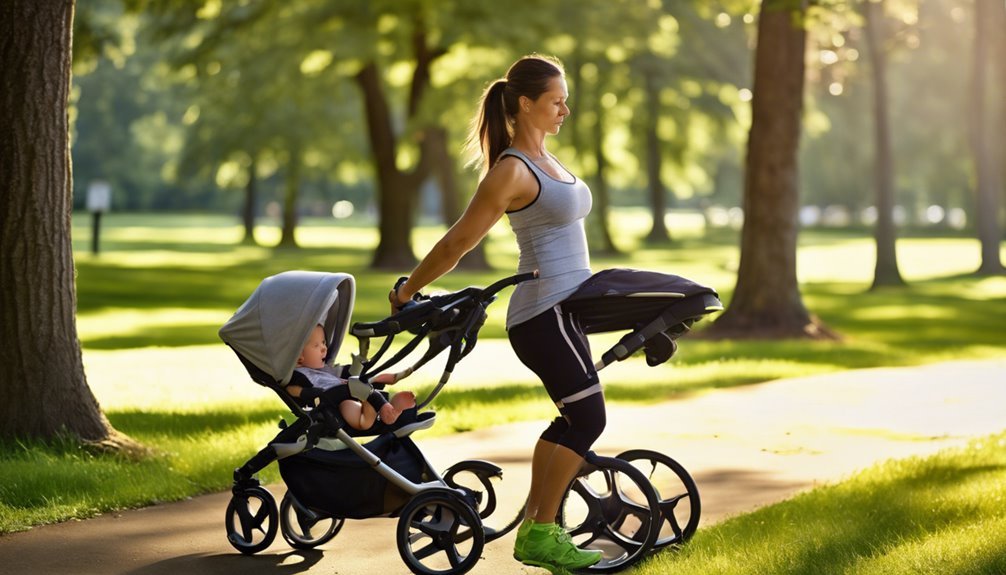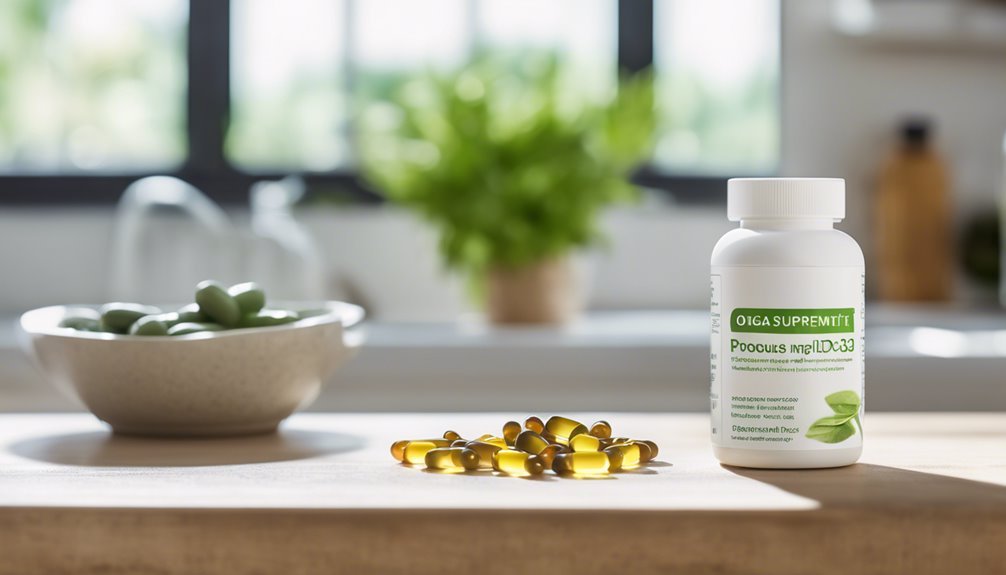You've nourished your baby, now it's time to nourish yourself. Balancing nutritious foods, staying hydrated, and finding time for physical activity are essential steps to boosting your immune system postpartum. But how do you integrate these elements effectively when time is at a premium and fatigue is your constant companion? Let's explore some practical strategies that not only fit into your new lifestyle but also support your body's recovery, ensuring you're there for your baby, healthy and strong. What might surprise you are the simple adjustments that can significantly impact your overall well-being.
Key Takeaways
- Eat nutrient-dense foods like lean proteins, whole grains, and fresh fruits to support immune health.
- Ensure adequate hydration by drinking at least eight 8-ounce glasses of water daily.
- Engage in regular physical activity like walking or yoga to enhance immune function.
- Prioritize sleep by establishing a consistent routine and optimizing the sleep environment.
- Manage stress through mindfulness techniques and maintain strong social connections for emotional support.
Prioritize Nutritious Foods
To boost your immune system after having a baby, start by prioritizing nutritious foods that support recovery and enhance immune function. You're not just eating for energy, but to rebuild and fortify your body.
Focus on incorporating foods high in nutrient density. These include lean proteins, whole grains, fresh fruits, and vegetables. They provide essential vitamins and minerals such as vitamin C, vitamin A, iron, and zinc, all crucial for immune support and overall health.
Effective meal planning is key. It isn't just about choosing the right foods; it's about ensuring these choices are readily accessible when you need them. Prepare meals in advance that are rich in these nutrients. This approach not only saves time but also reduces the temptation to opt for less nutritious alternatives when you're tired or pressed for time.
Include a variety of foods in your diet to cover the spectrum of nutrients your body requires. Foods like blueberries, spinach, and almonds aren't just tasty; they're packed with antioxidants and other health-promoting compounds.
Stay Hydrated
Why is staying hydrated so crucial for your immune system, especially after childbirth? Postpartum, your body requires significant fluid replenishment to recover and maintain optimal health. Hydration supports various physiological functions, including enhancing cellular function, detoxification processes, and nutrient transport—keys to a robust immune system.
When you're well-hydrated, your body is better equipped to produce lymph, an essential component of your immune system that helps to circulate white blood cells and nutrients.
To ensure you're getting enough fluids, aim to drink at least eight 8-ounce glasses of water daily. However, fluid sources aren't limited to water alone. Consider incorporating a variety of beverages and hydrating foods into your diet. Herbal teas, broth-based soups, and fruits like watermelon and oranges are excellent choices that provide hydration and nutrients.
Here are some practical hydration tips:
Carry a reusable water bottle to remind yourself to drink regularly throughout the day.
Also, if you're breastfeeding, you might need additional fluids to stay hydrated and support milk production.
Listen to your body's cues—feeling thirsty is a clear sign you need to drink up.
Prioritizing hydration will help you serve yourself and your baby with strengthened health and vitality.
Implement Regular Exercise

After childbirth, incorporating regular exercise into your routine can significantly bolster your immune system. Regular physical activity supports your body's defensive mechanisms by promoting good circulation, which allows immune cells to move more freely and efficiently. Starting with a home workout can be a practical choice, allowing you to stay close to your baby while taking care of your health.
Outdoor activities can also be beneficial. Fresh air and natural sunlight are excellent for your mood and vitamin D levels, which play a crucial role in immune function. Here's a quick guide to get you started:
| Type of Exercise | Benefits |
|---|---|
| Home Workouts | Safe, convenient, can be tailored to your energy levels and available time. |
| Walking | Low impact, boosts cardiovascular health, supports weight management. |
| Yoga | Reduces stress, improves flexibility, enhances respiratory health. |
| Cycling | Increases stamina, ideal for cardiovascular fitness, can be done at a moderate pace. |
It's important you listen to your body and start slowly, gradually increasing the intensity and duration of your workouts. Remember, consistency is key, so find activities that you enjoy and can stick with to help both your physical and immune health.
Get Adequate Sleep
Getting adequate sleep is vital for your immune system to function optimally, especially after the physical and emotional demands of childbirth. Research shows that sleep deprivation can weaken the immune response, leaving you more susceptible to infections. Thus, establishing effective sleep strategies is paramount.
Firstly, develop a consistent sleep routine. Going to bed and waking up at the same time each day can significantly improve the quality of your sleep. This regularity supports your body's natural circadian rhythm, promoting deeper, more restorative sleep.
Secondly, optimize your sleep environment. Ensure your bedroom is conducive to sleep; it should be cool, quiet, and dark. Consider using blackout curtains and white noise machines to block out disruptions. Additionally, invest in a comfortable mattress and pillows to support a good night's sleep.
Lastly, be mindful of your pre-sleep activities. Limit exposure to screens and bright lights at least an hour before bedtime, as blue light from devices can disrupt your body's melatonin production, a hormone critical for sleep regulation.
Manage Stress Effectively

While managing your sleep schedule is a key component in boosting your immune system postpartum, effectively handling stress is equally significant. Chronic stress can significantly weaken your immune response, making you more susceptible to illness.
Here's how you can manage stress effectively:
1. Practice Mindfulness Techniques: Engage in mindfulness exercises like meditation or yoga. These practices help you center your thoughts and calm your mind, reducing stress levels.
Studies show that regular mindfulness practice enhances mental health and supports immune function.
2. Incorporate Relaxation Exercises: Allocate time each day for relaxation exercises such as deep breathing or progressive muscle relaxation.
These simple techniques can be done anywhere and require only a few minutes. They work by lowering your heart rate and reducing blood pressure, thereby diminishing overall stress.
3. Establish a Routine: Create a daily routine that includes time for yourself.
Whether it's reading, taking a warm bath, or just sitting quietly, having dedicated "me time" can significantly reduce stress levels.
Consider Breastfeeding Benefits
Considering the benefits of breastfeeding can significantly enhance your immune system recovery postpartum. Breastfeeding isn't only beneficial for your baby but also for your own health, particularly in bolstering your immune defenses after childbirth.
When you breastfeed, your body releases prolactin, a hormone that helps regulate the immune system. This hormone plays a crucial role in promoting the development of white blood cells, which are essential in fighting infections.
Moreover, the act of breastfeeding activates certain pathways in your body that support the restoration and maintenance of immune health. It helps reduce the risk of postpartum infections and has been linked to a lower likelihood of developing certain autoimmune diseases later in life.
The intimate contact involved in breastfeeding also supports the maternal bond, which can indirectly boost your immune function by reducing stress and promoting psychological well-being.
To leverage these breastfeeding benefits effectively, it's critical to maintain proper nutrition and hydration, as these are foundational for sustaining healthy lactation.
Take Supplements Wisely

After exploring the immune-enhancing benefits of breastfeeding, you may also consider the role of dietary supplements in your postpartum health regimen.
It's crucial to select supplements that support your body's healing and immune system without compromising your overall health.
Here are some key points to keep in mind:
- Consult Healthcare Providers: Before starting any supplements, especially herbal supplements, consult with your healthcare provider. They can recommend specific supplements that are safe and beneficial during the postpartum period.
- Focus on Vitamin D: Vitamin D is vital for immune function, and its deficiency is common in postpartum women. A blood test can help determine if you need a Vitamin D supplement to maintain optimal levels for both your health and your baby's development.
- Quality over Quantity: Choose high-quality supplements certified by third parties. Avoid those with unnecessary fillers or additives, as purity is essential, particularly if you're breastfeeding.
Maintain Hygiene Practices
Maintaining strict personal hygiene is crucial as you recover from childbirth and care for your newborn. Effective handwashing techniques are fundamental. You should wash your hands for at least 20 seconds with soap and warm water, especially before and after handling your baby, and after touching any potentially contaminated surfaces. This helps prevent the spread of germs that can compromise your and your baby's health.
Surface disinfection is equally important. Regularly clean and disinfect frequently touched surfaces in your home, such as doorknobs, mobile phones, and kitchen counters. Use a suitable disinfectant that's proven to kill viruses and bacteria. Ensure you follow the product instructions to maximize effectiveness.
Remember, pathogens can linger on textiles as well. Wash clothing, bedding, and towels at a temperature high enough to eliminate germs, typically around 60°C (140°F).
Be diligent in cleaning areas where you change your baby's diapers, as these spots are particularly prone to contamination.
Limit Alcohol Consumption

Reducing your alcohol intake is essential for strengthening your immune system as you recover postpartum. The period following the birth of your baby is critical for your body to heal and regain strength.
Alcohol can impede this process by weakening immune function and slowing recovery.
Here are three practical steps to help limit your alcohol consumption:
1. Choose Alcohol Alternatives: Opt for non-alcoholic beverages that can provide a satisfying taste without the effects of alcohol. Herbal teas, sparkling water with a splash of juice, and non-alcoholic wines are great substitutes that support your immune health.
2. Practice Mindful Drinking: Set clear limits for yourself if you choose to drink. Being mindful about why and how much you drink can lead you to healthier habits.
Consider why you're reaching for a drink and if there might be healthier ways to achieve the same goal, such as relaxation or social connection.
3. Educate Yourself: Understand the impacts of alcohol on postpartum recovery. Knowing the facts can empower you to make better choices.
Research suggests that even moderate alcohol consumption can disrupt sleep patterns and hormonal balances, which are vital to recovery.
Connect Socially
Building strong social connections is crucial for enhancing your immune system postpartum. Research consistently shows that well-connected individuals often experience better health outcomes, including enhanced immune function. After childbirth, you might feel isolated, but engaging in community activities and support groups can significantly help.
Participating in community activities not only distracts from the daily stresses of new parenthood but also stimulates your mind through positive interactions. These activities could range from a fitness class at a local park to volunteering in community service. Each interaction contributes to a healthier emotional state, which directly affects your physical health.
Support groups, in particular, offer a platform where you can share experiences, seek advice, and receive emotional backing from those who understand your situation firsthand.
These groups often facilitate a sense of belonging and provide practical support that can alleviate stress. Stress reduction is vital in maintaining an effective immune system, as chronic stress can suppress its function.
Monitor Mental Health

While adapting to life after childbirth, it's crucial to keep a close watch on your mental health, as it significantly influences your immune system's effectiveness.
The postpartum period can challenge your emotional and psychological well-being, thereby impacting your physical health. Here are three ways to monitor and improve your mental health:
1. Practice Mindfulness Techniques****: Engage in mindfulness exercises like meditation, deep breathing, or yoga. These practices help reduce stress, anxiety, and depression by fostering a sense of peace and present-moment awareness.
Studies show that regular mindfulness can decrease cortisol levels, a stress hormone, thereby boosting your immune function.
2. Seek Emotional Support****: Don't hesitate to reach out for emotional support from friends, family, or support groups. Sharing your experiences and feelings can alleviate feelings of isolation and overwhelm.
Emotional support is crucial for mental resilience, enhancing your ability to cope with stress.
3. Establish a Routine: Create a daily routine that includes time for self-care and relaxation. A predictable routine can provide a sense of stability and control, which is especially valuable when you're feeling vulnerable.
It's also linked to better sleep patterns, which can directly influence immune health.
Seek Medical Advice Regularly
Regular consultations with your healthcare provider play a crucial role in maintaining your immune system after childbirth. These check-ups are essential, not just for managing immediate postpartum needs but also for long-term health monitoring. They serve as a fundamental aspect of preventative care, ensuring that any potential health issues are identified and addressed promptly.
During these visits, your doctor can assess your recovery from childbirth, evaluate your nutritional status, and check for signs of postpartum depression or infections—all factors that can influence your immune function. It's important you're transparent about any symptoms you're experiencing, no matter how minor they may seem. This openness allows for a comprehensive assessment and targeted interventions.
Moreover, these regular appointments provide an opportunity to discuss and update your vaccinations, which are crucial for protecting both you and your baby from infectious diseases. Your healthcare provider can also offer guidance on effective stress management techniques and healthy lifestyle practices that support immune health.
Frequently Asked Questions
Can Allergies Affect My Immune System Postpartum?
Yes, allergies can indeed impact your immune system postpartum.
Experiencing allergy symptoms can signify that your immune response is hyperactive, often diverting resources away from other immune functions.
Managing these symptoms effectively is crucial, as it helps stabilize your immune system's overall functionality.
It's essential to consult healthcare professionals who can provide tailored advice and treatment options.
This way, you're not only caring for yourself but also ensuring you're at your best for your loved ones.
How Does Air Quality Impact Postnatal Immune Health?
Air quality is the unseen shield that protects your postnatal immune health.
Exposure to airborne pollutants and indoor toxins can weaken this shield, making you more susceptible to infections.
Studies show that reducing these contaminants in your environment significantly bolsters immune function.
Investing in air purifiers and ensuring proper ventilation can serve as preventive measures to safeguard your health, allowing you to better serve and care for others around you.
Are There Specific Immune-Boosting Herbs for Postpartum?
Yes, there are specific herbs known for their immune-boosting properties that you can consider.
Echinacea, garlic, and ginger are popular for their ability to enhance immune function. These herbal remedies support your body's natural defenses.
It's important to consult with a healthcare provider before starting any new herbal regimen, especially to ensure they're safe and appropriate for your specific health needs.
Incorporating these can be a beneficial part of maintaining your health.
Can Vaccinations Affect My Immune System After Childbirth?
Vaccinations can vitalize your immune system post-childbirth.
Timely vaccines enhance your immune response, helping ward off infections efficiently.
It's crucial to adhere to recommended vaccination timing to maximize protection for both you and your baby.
This practice not only supports your health but also serves the well-being of your community by preventing the spread of diseases.
Always consult your healthcare provider for personalized advice on postpartum vaccinations.
How Do Seasonal Changes Affect Immunity Post-Delivery?
Seasonal changes can significantly impact your immunity post-delivery. As temperatures fluctuate, your body must adapt, potentially weakening your immune defense. This makes you more susceptible to seasonal illnesses.
To counteract this, prioritize getting enough rest, maintaining a nutritious diet, and staying hydrated.
Don't hesitate to consult your healthcare provider for more personalized advice, ensuring you're taking the best care of yourself and, by extension, those you care for.
Conclusion
Boosting your immune system postpartum is crucial. By adopting these practices, you're not just investing in your health but also in your baby's well-being. Interestingly, studies show that mothers who engage in moderate exercise and maintain a balanced diet experience a 50% reduction in postpartum depression symptoms. Prioritize your health by following these evidence-based guidelines, and consult your healthcare provider regularly to ensure you are on the right track for a healthy recovery. Stay connected, stay healthy.




